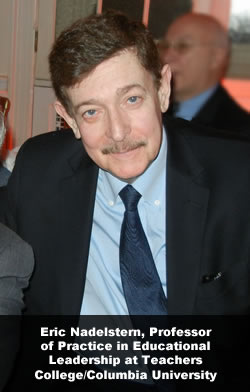A Day at the SPA (Summer Principals Academy) at Teachers College
By Yehuda Bayme
 The Summer Principals Academy at Teachers College, Columbia University is a principal preparatory graduate program that strives to prepare leaders with the abilities not just to perpetuate schools as they currently exist, but to innovate and accommodate to a changing population. Having in mind the growing necessities of a diverse socioeconomic infrastructure, SPA is committed to promoting equity and excellence in education and overcoming the gap in educational access and achievement between the most and least advantaged groups in this country. To achieve this goal, aspiring school leaders are encouraged to construct transforming possibilities for student learning, school improvement, social equity, and opportunity.
The Summer Principals Academy at Teachers College, Columbia University is a principal preparatory graduate program that strives to prepare leaders with the abilities not just to perpetuate schools as they currently exist, but to innovate and accommodate to a changing population. Having in mind the growing necessities of a diverse socioeconomic infrastructure, SPA is committed to promoting equity and excellence in education and overcoming the gap in educational access and achievement between the most and least advantaged groups in this country. To achieve this goal, aspiring school leaders are encouraged to construct transforming possibilities for student learning, school improvement, social equity, and opportunity.
The program, under the expert direction of Eric Nadelstern, is designed using integrated set of experiences as examples to learn from. They include sound theoretical and “best practice” knowledge, problem-based coursework and field-based experiences, including an intensive and extended internship. Aspiring school leaders pursue coursework and skill development over two consecutive five-week summer semesters and undertake site-based research projects and internships at their schools of employment during the remaining year.
There are two cohorts of students in the program. One is the entering group and the other is the graduating one. Currently there are over four hundred students enrolled. Some of the courses include Intro to School Leadership, Supervision of Teaching and Learning, and Conflict Resolution. When they graduate the students will have earned a Master’s degree from Columbia University.
As part of the requirements for graduation, the senior cohort is split up into small groups to do the New School Design Project (NSDP). Here students use every resource possible to fully plan the building of a simulation school. This year, at the Cowin Conference Center at Teachers College, Dr. Pola Rosen was asked to be on the panel of judges for the best New School. The groups that presented planned for their schools to handle a variety of issues. Examples included programs for underprivileged children, mentorships and emotional health awareness, budgeting, individualized academic trajectory monitoring, professional development for the teachers, parent involvement and recruitment. Many focused on real facts about poverty in certain cities.
Groups proposed ideas to the panel that reflected school spirit and culture. Examples included having community gardens, student assistant chefs, educational field trips with homework, school “grandmas”, 21st Century skills based courses, and “mobile” schools. Each presentation was followed by a question and answer session.
This program highlights the fact that public schools are going in new directions to ensure that students are being served properly. These school leaders have learned a variety of skills in these classes. The projects convey the message that the Summer Principal’s Academy at Teachers College is doing a great job educating our future leaders. #
